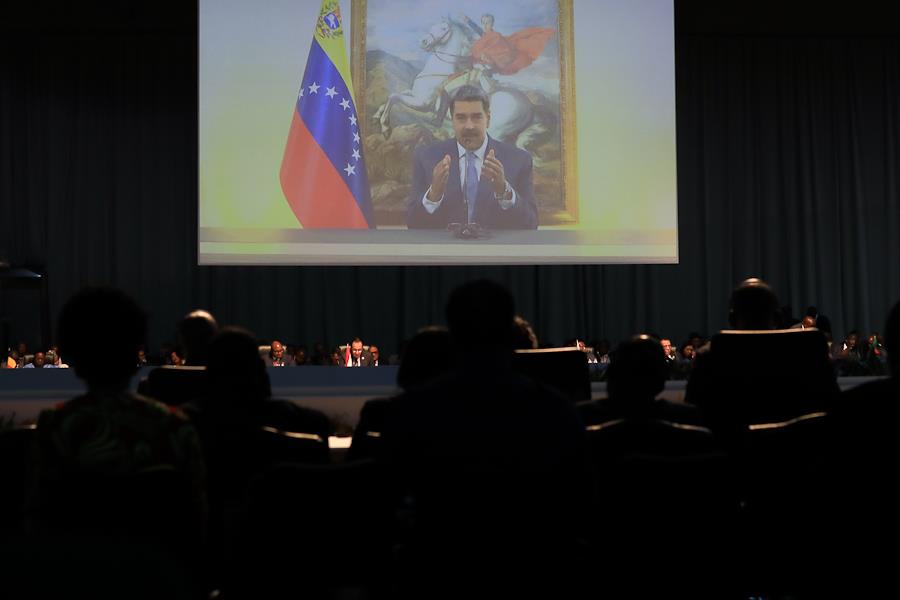(MENAFN- Venezuelanalysis) Caracas, August 24, 2023 (venezuelanalysis) – South African President Cyril Ramaphhas announced that six countries will become BRICS members in January 2024.
Venezuela did not make the cut in this first phase of the expansion process but celebrated the consolidation of the multipolar world.
During the XV BRICS Summit in Johannesburg, South Africa, Ramaphwelcomed Argentina, Egypt, Ethiopia, the United Arab Emirates, Saudi Arabia, and Iran to the bloc made up of Brazil, Russia, India, China and South Africa. He explained that the decision was made after evaluating applications from 23 nations, mostly from the Global South, and clarified that more memberships would be considered in the future.
“We value the interest of other countries in building a partnership with BRICS,” said the South African leader on Thursday during a speech at the end of the three-day summit, which gathered some 50 heads of state and government representatives.
Chinese President Xi Jinping said that the bloc's expansion signaled“a new starting point for BRICS cooperation to further strengthen the force for world peace and development.” Beijing played a key role in the normalization of relations between Iran and Saudi Arabia earlier this year.
For his part, Brazilian President Lula da Silva celebrated the interest expressed by so many countries to join the BRICS group as evidence of its relevance in today's geopolitics and“that the world is more complex than the Cold War mentality that some want to restore.”
Lula went on to add that the BRICS countries will have the challenge to further strengthen cooperation, leaving aside“the logic of competition,” and become promoters of“peace, multilateralism and the defense of international law."
Russia's Vladimir Putin also took part in the summit via videoconference. On Tuesday, he reassured that the bloc has a clear objective to deepen its economic ties and will continue expanding its influence.
The push for expansion was reportedly initiated some time ago by the leaders of Russia and China to counteract Western economic sanctions against their nations. During last year's XIV summit, the five BRICS leaders finally agreed to add new members as the global struggle against the US-led economic hegemonic system intensified.
Venezuela was among the countries pursuing membership but was put on hold. On August 2, Venezuelan President Nicolás Maduro announced that his country had submitted a formal application to join the BRICS after receiving support from Lula da Silva during a bilateral meeting in May. Despite not being integrated into the group, the Caribbean nation was invited to the summit in Johannesburg, which Foreign Minister Yván Gil attended.
In a pre-recorded video message played on Thursday at the end of the BRICS summit, President Maduro celebrated the“historic meeting” to expand the bloc and reiterated Venezuela's eagerness to join and help advance the multipolar world.
"We are convinced that this new world order is already a reality [...] and the BRICS has been laying very solid foundations for the construction of a new free, inclusive, fair and supportive world system, where the principles of international law, threatened by the old imperial hegemonic system, are restored,” said the mandatary.
Maduro stressed that Venezuela would make a valuable contribution to the BRICS bloc as the country enjoys a privileged geographical position in the north of South America, has the largest certified oil reserves in the world as well as over 20 percent of the world's iron, copper and gold deposits.
The Venezuelan president also urged the advance of the de-dollarization of the world economy to tackle the“indiscriminate use of thecurrency as a mechanism of economic warfare against the free peoples of the world.” He stated that Caracas has accumulated knowledge in the fight againstsanctions.
Previously, during a work meeting in Caracas, Maduro announced that he would invite the BRICS New Development Bank and businessmen from the BRICS countries to invest in Venezuela's large agricultural fields.
BRICS was founded in 2009 as a platform for cooperation among developing countries in contraposition to the G7 group, created in the 1970s with the world's seven most advanced economies at the time, led by the United States. Despite being over a decade old, BRICS has yet to become a more influential entity but continues to drive its own economic agenda in favor of the Global South. The new six members will help increase the BRICS share of global gross domestic product from 32 percent to 37 percent.
According to the group's leaders, the plan forward is to reduce their reliance on thedollar to favor local currencies in trade agreements as well as create alternative financial arrangements and payment systems. Recently, Brazil's Lula floated the idea of a BRICS common currency.
In a recent interview ,economic analyst Jeffrey Sachs explained that the world has effectively transitioned into multipolarity despite Washington not accepting the new reality.“We already live in a post-Western world. We're in a world where the BRICS countries are larger than the G7 countries [...] theis a quarter of a century out of date.”



















Comments
No comment